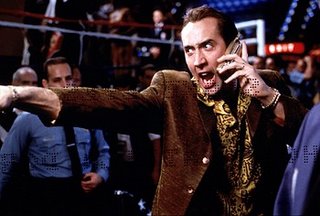Somewhere in space, the tempest of intellection vs. emotion in contemporary poetry ensues, participants more passionate than habitual losers at downbeat racetracks.
No one walks away happy from these discussions, of course. Although common sense, the proper place for one or the other of those qualities lies in the middle, with a dominant tone depending on what is being composed, matters get sidetracked to issues that leave
aesthetics behind and land somewhere in the swamp of Deeply Held Personal Beliefs.
The outcome from that kind of morass, in the extreme, are crusades, jihads, and obsession with celebrity murder trials. Barry Goldensohn's poem
"Reading Faust When Young"
hasn't calmed me down, in any case. Sometimes it's harder to stay in the center of a
discussion than on other occasions:
Reading Faust When Young
for David Mamet
I remembers only the leap from the bridge
into the turbulent river after knowledge,
but not what special knowledge or what power
ever came his way in the old story.
I was young when I read it. Immortality
meant art, and Faustus was never an artist.
And as for girls, you didn't need the devil when you offered everything. What did he really
need to know? What did she feel and could never say about the girl because
she had no words for it? He had little
to say to the Greats. Helen was a peep-show.
And the stuff about his soul—
well, that was religious and historical.
Overreaching for me was natural. I wanted
to know everything, to stay forever in school
taking courses. God and the devil
never figured in. With his snaky tail,
the devil was too fanciful to explain
the lines waiting for gas or a bullet and ditch
and firebombs and carpet bombs and the icy
rapture of ideologues shouting about who to kill
and who to save. My fellow humans were real:
their evil was sufficient. The sacred
was love and art and the political dream.
The world-drunk heart was what I took for the soul,
which dulled the edge of Faustus' sacrifice,
and god was never real enough to love or lose.
©2003 Barry Goldensohn
All told, this is not a bad bit of remembering, though it seems a fanciful evocation of some delayed connecting of points whose effect, I think, ought to have less earth-shaking patios. There's a lot of throat-clearing harrummmmmphing going on in the lines as I read them where a slighter, more minuscule rhetoric could have prevailed.
There's something to be said for distanced irony, the now-I-get-it school, but since the instances were fleeting, minor, gradients of perception building to a larger, if not earth riving sharpness, a voiceless swaggering in its couched self-loathing would fit the material better. It would seem a better idea if Goldensohn hadn't mentioned Faust or Jung at all but in the title, and instead placed us smack dab in the action of his past thinking, the incidents as he vividly recalls doing them in his earnest, youthful practice of applying his hormone-fused enthusiasms upon his world.
The mention of the big names and their ideas, though nicely arranged and phrased, are too precious for me to take this as anything more than an occasional poem that would normally find its way to the bottom of a drawer: it fairly gloats with its knowingness, and the author sounds too close to thinking that his eventual lesson learned is something to glory in.
Look at me. I am wrong on a higher plane.
The piece is overloaded with references and glancing mentions of religion and myth; the poet's voice aside, this poem reads like an abstract of a freshman's ill-crafted term paper. One may ask Isn't a lyric poem supposed to be about emotion? Yes, a lyric poem is the verbal equivalent of a musical evocation of intense feeling that defies the logic of words to express adequately. Thus, the looping chains of association, the constant comparisons of unlike things, including the sounds of the words creating euphony. Intense emotion colors the entire world, cast in all engrossing tints. The world to the perceiver makes a certain kind of sense, though the sense eludes them more often than not; there is even an element of paranoia that can come to play here, as in the notion that everything in the world, be it people, places, things, institutions, weather, are all somehow connected to the internal transformation. The irony alone isn't an emotion, but because it has something to do with an individual's perception, whether the poem's speaker or the reader, it can become a key determining factor in how hot emotion might boil or cool off, whatever the case may be.
Irony concerns the incongruity between what is said and what actually is the case. Since a lyric poem operates on the transcendent level where emotion bypasses logical argument in pursuit of impossible language, capturing the inexpressible conflicts, disjunctions, distortions, and contradictions between myth and fact, action and deed are likely to happen as default conditions. They will ratchet up the energy a lyric swoon requires.
I do think that my own work and explications regarding verse aim toward a Dionysian expansion. Still, unlike a host of others before me who pursued that expansion into sheer incomprehensibility --Kerouac, late John Ashbery, Pound, Language poets who never stopped being enamored of their ability to type non-sequiturs--I think the image, lines, and music need to be reined in, operate within strictures, Jazz is hardly a formless expulsion sans melodic infrastructure, since the quality of the best sets of spontaneous composition requires suitable composed materials to contextualize the extrapolation; the form of the melody being extrapolated upon gives shape to the musician's improvisations.
There's a point in the kind of poetry I find appealing and the poets I think do interesting work where they have to acknowledge something a real subject set in the material world, the physical world, and that there is a need to link the most fanciful forays and high-flying linguistic maneuvering to real emotion, producing something at the end resembling whatever effect the writer thinks he's working for. It's a dialectical process, for want of another term, thesis, antithesis, synthesis.
Simply because something is transcendent about existence does not imply that it is illogical or incomprehensible.
Exactly. I think there are many instances, occasions, events, emotions, all sorts of confounding affairs that are absolute without meaning as we understand based on the equation of binary oppositions, i.e., something that is not this must therefore be that.
Still, I believe that there are ways of understanding that instances require an
acute use of intuition and instinct.I am not opposed to intellection coming into works of emotional duration, but something needs to connect with the reader as a felt experience. Otherwise, it's a waste of time reading a work composed solely for the novelty of showing off what one remembers from undergraduate survey classes.
don't mind, and even encourage a poet to intellectualize as they write their lines, but the issue is about proportions and ratio. Goldensohn's intellection is strained for the amount of memory he's actually working on; the epiphany is too slight for the evocation of top-heavy names like Faust. Faust, of course, could have been used effectively as a reference serving a satisfying conclusion, but the hand is heavy here when the name and its cache is played. Irony trumps everything, as the saying goes, but it can also kill everything that's going on in work, and the willingness to abstract compulsively here makes for a small work that is all over the map. It's an over-packed suitcase.
Stevens's strategies are better, in so far that his work is about the experience, at the moment, in the intelligence of a perceiver who is in witness to things that will not yield their essence in the metaphysical sense. Though not overtly emotional, Stevens crafts a supreme fiction he often spoke of to take the place of the secrets that are forever unknown, a dramatized system of perception that acknowledges the world as its own adequate symbol.
Stevens was entering the world, and to have the world he experiences shape and forms his readings and writings; I think he wrote as a man who was in that legendary state of constant becoming. Goldensohn sounds lost at best, though I am sure he can write a decent poem. This isn't one of his better ones.
Stevens believes in the adage that there ought to be "no ideas but in things..." (concisely phrased and explained by William Carlos Williams). Stevens, with compatriots Williams, Eliot, et al., were, in their varied ways, obsessed with making language a hard, malleable material no less than clay or steel, and they wanted to write and elaborate upon images that didn't obscure the fantastic qualities of the world their language was supposed to be writing about. Perception is a dominant concern for this generation of modernist poets. I believe Stevens followed the loose dictates brilliantly and developed a methodology of processing the world that could capture in it many of its amazing juxtapositions. What is amazing about Stevens' work is that he develops a philosophy of perceptual imagination from the world as it already is.
As for supreme fiction, well, it's Stevens' term, and it is a brilliant shorthand for his unique compositional practice. The work isn't about methodology and philosophy, it's about the world Stevens experiences as a human being and the ideas these experiences brought to him when he came to write about them. Any good writer gets a set of ideas they work on throughout their careers as artists, and Stevens is no different. I don't call it blabbing, however, since I think his work grew deeper and more refined, and his voice became more refined and musical as he aged, all in the service of developing his subjects and the ideas they inspired. Eliot, Shakespeare, Whitman, Rilke, Goethe, O'Hara, Dickens; each developed a set of ideas they wrote about continuously, though hardly as a matter of adhering to some doctrine they were locked into. The result is work worth reading and digging into, though one makes allowances for individual preference.














